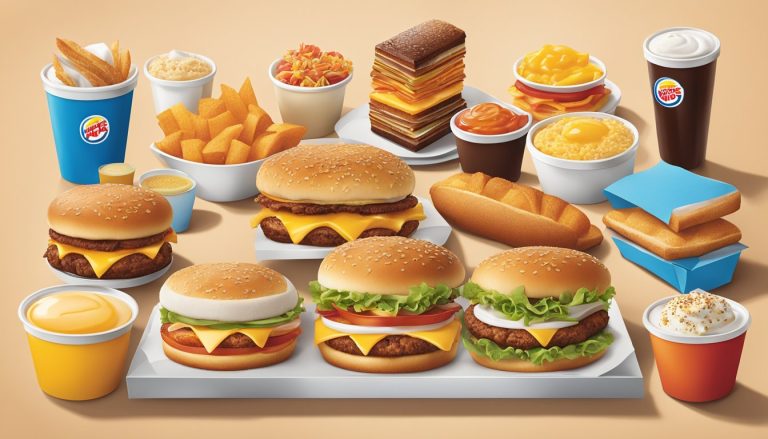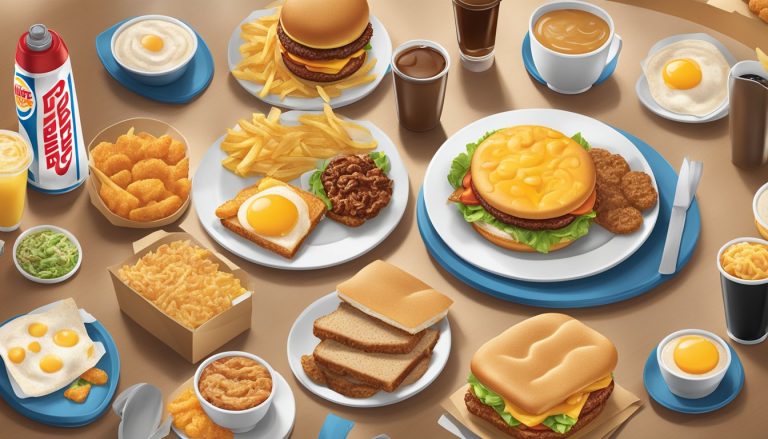Burger King’s breakfast menu has evolved since its late 1970s debut, offering a mix of classic favorites and innovative options. The menu caters to diverse tastes, featuring traditional platters alongside heartier sandwiches like the Croissan’wich. Burger King serves breakfast from 6 a.m. to 10:30 a.m. at most locations, giving customers a window to enjoy morning meals before the switch to lunch items.
The breakfast lineup balances familiar staples with creative twists. Eggs, sausage, and toast form the foundation of many dishes, while new additions like the Spicy Sausage, Egg & Cheese Croissan’wich bring excitement to the menu. This blend of tradition and innovation keeps BK competitive in the fast-food breakfast market.
Burger King’s approach to breakfast reflects changing consumer preferences and dietary needs. The menu offers options for those seeking hearty meals to start their day, as well as lighter choices for the health-conscious. This variety ensures that Burger King remains a popular breakfast destination for a wide range of customers.
History of Burger King’s Breakfast
Burger King’s breakfast menu has evolved significantly since its inception, reflecting changing consumer tastes and industry trends. The company’s journey into morning offerings showcases both innovation and adaptation in the competitive fast-food landscape.
Origins of the Breakfast Menu
Burger King entered the breakfast market in 1979, several years after McDonald’s pioneered fast-food breakfast. The move aimed to capture the growing demand for convenient morning meals. However, Burger King faced a unique challenge – its signature flame broilers were not ideal for cooking breakfast items.
This equipment limitation forced the company to spend five years developing a breakfast menu compatible with its existing kitchen setup. The delay allowed competitors to gain an early foothold in the breakfast segment.
Evolution of Breakfast Offerings
In 1983, Burger King introduced the Croissan’wich, a croissant-based breakfast sandwich that became a cornerstone of its morning menu. This innovative item helped differentiate Burger King’s breakfast from its rivals.
Over time, Burger King expanded its breakfast options to include a variety of sandwiches, platters, and sides. The company has also experimented with regional offerings, such as hot dogs for breakfast in Japan.
Burger King’s breakfast menu continues to adapt to consumer preferences and market trends. The company has focused on balancing traditional favorites with new items to attract and retain breakfast customers in the competitive fast-food industry.
Analyzing Burger King’s Breakfast Menu
Burger King’s breakfast menu combines classic favorites with innovative offerings. The menu caters to diverse tastes and dietary preferences, providing options ranging from traditional sandwiches to more adventurous meal choices.
Signature Breakfast Items
The Croissan’wich stands out as a Burger King breakfast staple. This flaky croissant sandwich comes with various fillings like eggs, cheese, bacon, sausage, or ham.
French Toast Sticks offer a sweet alternative, perfect for dipping in syrup. They’re a popular choice for those with a morning sweet tooth.
Hash Browns complement many breakfast combos, providing a crispy potato side dish.
The Egg-normous Burrito packs a hearty meal into a convenient wrap, filled with eggs, cheese, bacon, and hash browns.
Breakfast sandwiches on biscuits or English muffins round out the classic offerings. The Sausage Biscuit remains a simple yet satisfying option for many customers.
Innovative Additions and Seasonal Specials
Burger King has expanded its menu to include healthier options like oatmeal, catering to health-conscious customers.
The Impossible Croissan’wich Meal showcases BK’s adaptation to changing dietary trends, offering a plant-based sausage alternative.
Pancakes remain a menu staple but occasionally feature seasonal flavors or toppings.
BK introduces limited-time specials to keep the menu fresh. These may include unique sandwich combinations or breakfast-inspired twists on their regular menu items.
Value deals, like $5 breakfast bundles, are periodically offered to attract budget-conscious diners.
Seasonal drinks, such as pumpkin spice flavored coffee, sometimes accompany these special promotions.
Nutrition and Ingredients

Burger King’s breakfast menu offers a variety of protein, carbohydrate, and dairy options. The nutritional content varies widely across menu items, with some providing hearty portions and others catering to lighter appetites.
Breakfast Meats: Sausage, Bacon, and Ham
Sausage patties at Burger King contain approximately 170 calories and 15 grams of fat per serving. They provide a significant protein boost but are high in sodium.
Bacon strips typically add 60-80 calories per serving and deliver a smoky flavor. They contain less fat than sausage but are still sodium-rich.
Black Forest ham is a leaner option, with about 30-40 calories per serving. It offers protein with less fat compared to other breakfast meats.
These meats are often paired with eggs and cheese in breakfast sandwiches, increasing the overall calorie and protein content.
Breads and Pastries
Biscuits used in breakfast sandwiches contain around 230 calories and 12 grams of fat. They provide a buttery texture but are high in refined carbohydrates.
Croissants offer a flaky alternative with approximately 260 calories and 14 grams of fat. They’re lighter in texture but similar in calorie content to biscuits.
English muffins are a lower-calorie option at about 140 calories per serving. They provide a chewy base for sandwiches with less fat than other bread choices.
French toast sticks, a popular sweet option, contain roughly 230 calories and 11 grams of fat per 3-piece serving. They’re higher in sugar compared to savory bread options.
Cheese and Egg Varieties
American cheese is the standard choice for most breakfast sandwiches. Each slice adds approximately 40-60 calories and 3-5 grams of fat.
Eggs are prepared in various forms. Scrambled eggs typically contain 140-170 calories per serving and provide essential proteins and nutrients.
Folded eggs, used in some sandwiches, have a similar nutritional profile to scrambled eggs but may vary slightly in portion size.
Egg whites are available as a lower-calorie alternative, with about 25 calories per serving. They offer protein without the fat content of whole eggs.
Cheese and egg combinations significantly impact the nutritional value of breakfast items, often doubling the protein content of sandwiches.
Breakfast Hours and Accessibility

Burger King’s breakfast hours and availability vary by location, offering flexibility for early risers and weekend brunchers alike. The chain strives to accommodate diverse customer schedules while maintaining operational efficiency.
Operating Times for Breakfast Services
Burger King typically serves breakfast from 6:00 AM to 10:30 AM on weekdays. This early start caters to commuters and those beginning their day. Weekend hours often extend until 11:00 AM, allowing for a more leisurely morning meal.
Some locations may adjust their hours based on local demand or regional preferences. It’s advisable to check with specific restaurants for exact timings.
Select breakfast items remain available throughout the day at certain locations, providing options for late-morning or afternoon cravings.
Geographic Availability
Burger King’s breakfast menu is available at most locations across the United States. However, menu items may vary slightly between regions to accommodate local tastes and preferences.
Urban areas often feature longer breakfast hours due to higher foot traffic and demand. Rural or less populated areas might have more limited breakfast times.
24-hour locations typically offer breakfast items around the clock, catering to night shift workers and early morning travelers.
International Burger King restaurants may have different breakfast hours and menu offerings, adapting to local dining customs and food preferences.
Customizing Your Meal

Burger King offers flexible options for personalizing breakfast orders. Customers can tailor portion sizes and ingredients to match their preferences and dietary needs.
Combos and Upsize Options
Breakfast combos at Burger King provide value and variety. Most combos include a main item, hash browns, and a small coffee or drink. Popular choices are the Croissan’wich or Biscuit combos. Customers can upsize their meal for a nominal fee, typically getting a larger drink and hash brown portion.
Some locations offer breakfast platters as combo options. These often include eggs, hash browns, and choice of meat like sausage or bacon. For those seeking a heartier start to their day, combo meals can be an economical choice.
Adding or Removing Ingredients
Burger King allows customization of breakfast sandwiches and burritos. Customers can add extra cheese, bacon, or sausage for an additional charge. Egg lovers may request double eggs on their sandwich.
For health-conscious diners, removing certain ingredients is also an option. Common requests include:
- No cheese
- No meat (for a vegetarian option)
- Substituting egg whites
Breakfast sides like hash browns can be added to any order. Coffee drinkers can customize their brew with cream, sugar, or flavored syrups at self-serve stations in most locations.
Culinary Insights

Chefs play a crucial role in shaping breakfast menus at fast food chains. Their expertise drives innovation while respecting traditional favorites. Industry trends also influence menu development, balancing familiar classics with novel offerings.
Role of Chefs in Menu Development
Chefs at Burger King lead culinary innovation, constantly experimenting with new flavors and ingredients. They create seasonal offerings like Halloween-themed items, incorporating colorful buns and spicy cheeses. The culinary team balances creativity with customer preferences, ensuring new items resonate with diners.
Chefs also focus on quality and taste, refining existing menu items. They work to perfect breakfast staples like egg sandwiches and hash browns. Their expertise helps maintain consistency across locations, a key factor in fast food success.
Breakfast Trends in Fast Food Industry
Fast food breakfast menus increasingly cater to diverse tastes and dietary needs. Chains like Burger King offer traditional platters alongside innovative sandwiches. Health-conscious options featuring lean proteins and whole grains are gaining popularity.
Digital ordering and drive-thru efficiency have become crucial in the breakfast segment. Chains invest in technology to speed up service during the busy morning rush. Some restaurants extend breakfast hours to capture late-morning customers.
Value remains a key driver, with many chains offering budget-friendly breakfast combos. However, premium ingredients and unique flavor profiles also attract customers willing to pay more for quality.
Beverage Pairings

Burger King’s breakfast menu offers a range of beverage options to complement its food items. From classic coffee to innovative drinks, BK ensures customers can find the perfect pairing for their morning meal.
BK Café and Coffee Innovations
BK Café serves as the cornerstone of Burger King’s breakfast beverage lineup. Priced at $1.99, this brewed coffee provides a warm, energizing start to the day. For those seeking a caffeine-free option, BK Café Decaf is available at $1.79. These coffee choices pair well with popular breakfast items like the Croissan’wich, creating a satisfying morning combination.
Burger King has also introduced innovative coffee options to cater to diverse preferences. These may include flavored lattes, cappuccinos, or iced coffee variations. Such additions demonstrate BK’s commitment to evolving its beverage menu alongside changing consumer tastes.
Cold and Hot Beverage Options
Beyond coffee, Burger King offers a variety of cold and hot beverages to suit different preferences. Cold options might include fruit juices, smoothies, or iced teas, providing refreshing alternatives for those who prefer chilled drinks in the morning.
Hot beverage choices likely extend to teas and hot chocolate, catering to non-coffee drinkers. These options allow customers to customize their breakfast experience according to their tastes and dietary needs.
BK’s beverage menu aims to provide options that complement its food items while offering standalone drink choices for those looking for a quick morning pick-me-up.
Pricing and Value Deals
Burger King’s breakfast menu offers cost-effective options and competitive pricing compared to other fast food chains. The menu balances affordability with variety to cater to different budgets and preferences.
Cost-Effective Breakfast Deals
Burger King’s breakfast value menu features items starting at just $1. The Sausage Biscuit and 3-piece French Toast Sticks are popular $1 options. For $1.19, customers can enjoy a Sausage Burrito or Sausage & Cheese Muffin Sandwich.
BK also offers combo meals for those seeking more substantial breakfasts. These typically include a main item, hash browns, and a drink. Prices for combo meals range from $3 to $7, providing good value for a full breakfast.
The Croissan’wich and Biscuit Sandwich combos start at $2.99, while the Pancake & Sausage Platter is priced at $3.69.
Comparing BK to Competitors
Burger King’s breakfast prices are generally on par with or slightly lower than major competitors like McDonald’s and Wendy’s. BK’s $1 value menu items are particularly competitive in the fast food breakfast market.
Wendy’s, a relatively new player in the breakfast arena, offers similar pricing but with fewer options. BK’s wider range of breakfast choices gives it an edge for customers seeking variety.
BK’s coffee prices are also competitive. A BK Cafe Coffee costs $2.69, comparable to other chains’ offerings. This pricing strategy helps BK maintain its position as a value-oriented option for morning diners.
Consumer Engagement
Burger King actively involves customers in shaping their breakfast experience. The fast-food chain employs various strategies to encourage interaction and gather valuable feedback from patrons.
Loyalty Programs and Digital Coupons
BK’s Royal Perks rewards program offers exclusive benefits to breakfast customers. Members earn points on purchases, which can be redeemed for free menu items. The program provides special discounts on breakfast combos and early access to new breakfast items.
Digital coupons are regularly distributed through the BK app and email newsletters. These offers often feature breakfast-specific deals, such as discounted Croissan’wiches or free hash browns with purchase.
BK uses push notifications to alert customers about limited-time breakfast promotions. This strategy drives morning traffic and encourages trial of new menu items.
Feedback and Menu Suggestions
Burger King actively solicits customer input on their breakfast offerings. The company conducts regular surveys through their mobile app and website, asking patrons to rate their breakfast experience.
BK’s social media channels serve as platforms for customers to share opinions on breakfast items. The brand responds to comments and uses this feedback to refine menu options.
Periodically, BK launches “Create Your Own Breakfast” campaigns. These initiatives invite customers to suggest new breakfast combinations or entirely new items. Popular ideas are sometimes incorporated into the menu, giving customers a sense of ownership.
Focus groups are used to test potential breakfast items before wider release. This approach ensures new offerings meet customer expectations and preferences.




